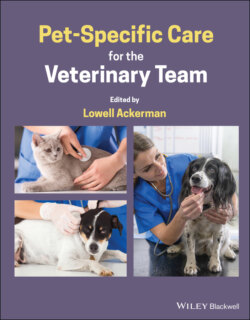Читать книгу Pet-Specific Care for the Veterinary Team - Группа авторов - Страница 86
1.6.4 Changing Practice Protocols
ОглавлениеVeterinary staff are typically well educated and dedicated to animal health, but at the same time they want to protect themselves and their families from transmissible diseases, and their concern is legitimate. For the foreseeable future, we should expect that they will appreciate ongoing instruction on practice safety protocols, patient flow, and access to appropriate personal protective equipment (PPE). Because veterinary teams work collectively, there should be protocols in place for monitoring the health of individual staff members, having policies for isolation and quarantine, and supporting unambiguous and generous policies about which situations should prompt team members to leave the premises to preserve the health of others. It is also important to be aware of the additional stress experienced by staff and how that can take an immeasurable toll on productivity, commitment, and teamwork. Most veterinary hospitals have a relatively small contingent of team members, so without careful and considerate policies, staff could wrongly interpret that their physical and mental health is not a major concern of the hospital, which would be a very unfortunate conclusion.
While they were always appropriate, protocols for personal hygiene were not always followed in periods prior to pandemics, but are definitely critical afterwards. There should be hand washing between each patient visit and adequate time allowed not only for sanitization of the examination rooms, but also for more thorough disinfection. This includes not only surfaces used for pets, but also those that might have contact from owners as well. This will add time to appointments which might eventually need to be recouped through increased fees.
Veterinary staff are extremely valuable and their health is an important concern, so there should be ongoing dialogue about what steps the hospital is taking to keep everyone safe. Whenever possible, such protocols should be institutionalized as standards of care (see 9.4 Standards of Care) and staff should be counseled and coached as to what they should be doing to keep themselves and each other safe. It is important to consider even minor risks and work collectively to address concerns. When staff appreciate that their ongoing health is a major priority, and when it is reinforced by other team members, they can be confident that things are being done to mitigate their risks for getting sick. It is important to realize that fear is likely to persist long after a pandemic, so relaxing standards should only be contemplated after robust team discussions and the best available evidence.
